- Home
- Deborah Kerbel
Feathered Page 2
Feathered Read online
Page 2
I push my food in circles around my plate. Fish sticks and ketchup. Mom’s made the exact same dinner for three weeks straight. I’d complain about it if I thought it would do any good. The strange part is, she’s a really great cook. When Daddy was alive, she made sure we sat down together for dinner every night. A big homemade dinner with each and every food group properly represented. And she always loved making up new recipes and trying them out on us. Nowadays, it’s either frozen food or takeout. It’s gotten so bad, Harrison usually doesn’t bother coming home to eat anymore. He eats at Matt’s house now and, as much as I hate Matt, I can’t say I blame him, ’cause dinners around here are as much fun as getting a tooth drilled. It’s probably one of the reasons my brother puts up with Matt — just so he can get a decent meal once in a while. Every night at dinner, Mom sits with her chair angled toward the window, sipping from a glass of water and puffing on those awful cigarettes. As far as I can tell, she never eats anything anymore. I don’t think I’ve seen her put a crumb of food in her mouth since Daddy’s funeral.
I just hope those cigarettes of hers are packed with vitamins and minerals … like the commercial says for my Apple Jacks.
CHAPTER 3
Matt and Harrison are hanging out at our house again today. Which means I’m hiding out in the backyard. I don’t mind so much. Our house is built on the edge of a small forest that borders a ravine. Between catching water striders, climbing trees and making daisy chains, there are lots of “pioneer girl” things for me to do to pass the time. The first thing I do is check on the birds’ nest. Their tiny twig home is so perfect and round … like a beautiful work of art. I’m relieved to see the baby birds are all still there. When I chirp a hello, they stick their little yellow beaks up in the air and squawk. They must be hungry, poor things.
“Don’t worry, guys,” I whisper, “I bet your mom is coming with food soon.”
I decide to leave the pioneer girl stuff for later and work on my Frisbee skills for a while. But after about half an hour of practicing the perfect toss, I watch it sail onto the next-door neighbor’s back porch. I stare at it for a minute while I consider my options.
1. Leave it and go play something else.
2. Hobble into their backyard and use my crutch to knock it off their porch.
3. Go ring the doorbell and ask for it back.
It’s an easy choice. They’ve had a month to settle in, after all.
Their doorbell gongs like organ chimes. After a minute or two, the knob turns and the door opens with a creak. A small girl with brown skin and long black hair appears in front of me. Her hair is parted in the middle and held back neatly with a pair of red barrettes and matching ribbons.
“Hello?” She says it like she’s asking a question. Her big eyes glide over me suspiciously. I smile and give her a little wave.
“Hi, I’m Finch. I live next door.”
She cocks her head, like she’s trying to figure out why I’m here. An even smaller girl pokes out from behind her. She’s sucking her thumb so hard, it squeaks.
“My Frisbee landed on your back porch,” I say. “I came to get it.”
The girl’s shoulders relax. For some reason, she seems relieved to hear this. “What happened to you?” she asks, pointing to my crutches.
“Oh. I … um, fell down the stairs.”
She nods but doesn’t say anything.
“So, is it all right if I come in so I can get my Frisbee?”
She glances behind her, like she’s checking for permission. “Okay, quickly,” she whispers, waving me in. Silently, we walk through the cool air-conditioned house toward the back door. I’ve never been inside this house before, so I’m surprised to see it’s the exact same layout as ours. Except everything’s flipped the opposite way … like it’s a Through the Looking Glass version of my own house. I’m guessing this new family’s furniture must not have arrived yet, because except for a couple of chairs and a few floor pillows, the house is completely bare. We pass behind a thin woman who’s kneeling on the hardwood floor in front of a shiny golden statue. The statue is wearing a garland of yellow and pink flowers. The woman is wearing a flowing orange shirt and matching pants. A tidy black braid hangs down the length of her back.
The girl holds a finger up to her lips. “Mother’s praying,” she says softly. The woman seems to be talking to the statue. As she raises her hands to her face, her collection of gold bracelets fall to her elbow. They jingle like little bells. I want to ask the girl what her mother’s praying for, but I stop myself. I’m smart enough to understand that I should be quiet when someone is praying. Kind of like how I imagine people would act at church. The girl leads me through the house to the sliding glass doors at the back. The little sister trails behind us like a tiny shadow. When we get to the back porch, the older girl picks up my Frisbee from the deck floor and hands it back to me. I can tell she’s pleased with herself for helping. We make our way back to the front door, quiet as ghosts.
“Thanks,” I say, once I’m sure we’re far enough away not to disturb her praying mom. “Do you want to come outside and play with me?”
“I don’t know,” she replies, twirling a strand of glossy hair around and around her finger. “I’ll ask Mother later.”
“We could play catch with my Frisbee. And I’ve got a badminton set in my backyard. And croquet, too.”
She stares at me like I’m speaking a foreign language. “My name is Pinky Nanda,” she finally says. “This is my sister, Padma.”
Padma is holding on to her big sister’s leg like her life depends on it.
“Nice to meet you,” I say, sticking out my hand. After a second, Pinky reaches out to shake it. A gold bracelet circles her wrist … a perfect match for the little gold hoops in her ears. I wonder if her family is rich. No kid I know wears real jewelry like that. “You’re pretty,” I say. She smiles a shy smile. “How old are you?” I ask.
“Eleven.”
I’m surprised to hear she’s my age. She looks so much smaller than me.
“How do you like your new house?”
She shrugs. “I like it. But I liked our old house more. It was next to a park … and I had a bigger room.”
“So why did you move?”
Another shrug. “My father said it would be better here,” she says. Then she presses her lips together like she’s trying to stop something else from coming out.
Better than what? I can’t help wondering.
“You’re coming to school in September, right? We’ll be in the same grade. Maybe the same class.”
She glances around again. Like she’s worried someone might be listening. “I hope so.” She says it so softly it’s barely a breath. “But I have to see what my father says. He might sign me up for a different school.”
This surprises me, too. “Why? Roseborough’s the closest. You can walk there in ten minutes.”
“He thinks a Hindu school is … better. He says I’ll like the kids there more. And learn more important things. But Mother doesn’t think so.”
“Well, they better decide fast because my school starts in two weeks,” I say. “The day after Labor Day. Just cross your fingers you don’t get Mrs. Garvin. I had her last year. She’s horrible.”
Pinky chews on her lip and doesn’t reply. Suddenly, I hear her mother calling from the other room. Her words sound fast and bubbly — like spilled marbles rolling across the floor. Pinky answers quickly, then turns back to me and pulls open the front door. “You have to go now.” She places a hand on my shoulder and presses me through the doorway. “Bye-bye.”
“Let me know about school, okay? We can walk together if you want. But your parents have to register you with the office ...”
Behind me, the door closes with a click. I stare down at the Frisbee in my hands, wondering what on earth I did wrong.
Harrison and Matt are
in the backyard when I return with the Frisbee. Too bad I’m not quick enough on my crutches to escape.
“Hey — you still crippled?” Matt says, running to cut me off before I can get away. He grabs one of my crutches and tosses it to Harrison. “Thanks. We’ve been looking for a baseball bat. Right, Harr?”
I turn to look at my brother, pleading silently with him to give it back. The last thing I want to do is give Matt the satisfaction of hearing me beg. But Harrison doesn’t make a move. He just stares at the ground like I’m not even there. Before I know what’s happening, Matt karate chops the other crutch out from under my arm. Now I’m standing there on one foot, feeling like a snail without a shell.
“You didn’t tell anyone about our game of Kiss the Rat, did you?” he says, stepping closer. His breath smells like rotten eggs. I put a hand over my nose and shake my head. “Good,” he says. He leans toward me and yanks the top edge of my yellow tube top back with his dirty-nailed fingers. He takes a second to steal a look at my skinny bare chest before letting it snap closed. My face burns with embarrassment. I clutch my top to myself, too scared and ashamed to make a sound. He smirks and picks my karate-chopped crutch off the ground. “Cool it, Flinch. It’s not like you have anything worth looking at anyway.”
Now my cheeks feel like someone’s lit them on fire.
“Hey, Matt! Look what I found!” Harrison shouts from the other end of the yard.
He points up into the chestnut tree. My heart stops.
“No!” I screech. But Matt’s already bounding across the grass like a German shepherd unleashed. Before I know what’s happening, he lifts my crutch in the air and topples the bird nest from the branch. I can hear the little babies chirping in distress. He bends down and picks up the nest. The birds are still inside. I can see their bright yellow beaks from here.
Then he picks up one of my badminton rackets from the grass at his feet.
Stop! I want to scream. Leave them alone! But I can’t say anything at all. Someone’s poured cement down my throat.
“Cut it out, Matt,” I hear Harrison say. But he’s too late.
“Keep your eye on the birdie, Flinch!” Matt hollers, tossing the little twig nest in the air and whacking it so hard it explodes on contact.
I scream and sink to my knees in the soft grass, squeezing my eyes shut so I don’t have to see anymore. Then I cover my face with my hands so that awful Matt won’t know how hard he’s made me cry.
CHAPTER 4
Mom didn’t get out of bed this morning. When I go to check on her, she’s lying on her side with the covers pulled up over her ear. But she isn’t asleep. Her blue eyes are wide open and staring at the wall.
“Ma?” I whisper. She doesn’t answer. I wonder if maybe she’s coming down with a cold or flu. Or worse, a case of scarlet fever. In Little House on the Prairie, that’s what made Laura’s sister Mary go blind. Or maybe she caught cancer, like Daddy and Terry Fox did. I’m scared now, so I walk over to her bedside and put my hand on her forehead, just like she does for me when I’m sick. No fever. Her skin is as cool as cucumber soup.
“I’m fine, Finch. I just don’t feel like getting up yet,” she mumbles when I ask what’s wrong. I lean down to kiss her tousled hair. Her eyes flutter closed. I linger in the doorway for a few minutes, wondering what to do next. My stomach growls loudly.
In the kitchen, I get myself a bowl and a spoon, a carton of milk and a near-empty box of Apple Jacks. I mix it all together and, voilà … breakfast is served. Harrison’s not home, so I sit at the table by myself. I don’t care, though. I’m still so angry at him for letting Matt smash the birds’ nest, I’ve vowed to never speak to him again.
After washing up my bowl and spoon, I check on Mom again, but this time she’s fast asleep and snoring softly. I feel weird and alone. Except for the hum from the window air conditioner, the house is as quiet as night. Like I’m the only person awake in the world. I slip on my shoes, go outside and sit in the shade of the house by the side garden. I don’t want to go into the backyard again. Not after what Matt did.
The sun is shining and the sky is as blue as Mom’s favorite eye shadow. The one she used to wear when her and Daddy would go out to a restaurant for dinner and leave Harrison and me with a crummy babysitter. Mom doesn’t wear eye shadow these days. Or lipstick or blusher either.
I pick a flat blade of grass, stretch it between my thumbs and make whistling sounds. I consider ringing Pinky’s doorbell again and asking her to come outside and grass-whistle with me. But a moment later, I see her face pop up in the window across from where I’m sitting. I drop the blade of grass and wave eagerly. She ducks away. I wait to see if she’ll come back, but she doesn’t, so I walk over to the window and peer inside. I can see the Nandas’ kitchen — the mirror image of ours. Except their version is all neat and tidy with no dirty ashtrays or stacks of dishes cluttering the counters like in my house. There’s a folded newspaper sitting at the edge of the wooden table and an empty teacup and saucer beside it. On the wall facing me, I spot a painting of an elephant sitting cross-legged on top of a giant flower. The elephant is dressed in bright clothes and it’s wearing jewels and a pink-and-yellow garland that reminds me of the one on the golden statue Mrs. Nanda was praying to the other day. At the elephant’s feet is a tiny mouse nibbling on a piece of food. I think it’s probably the strangest painting I’ve ever seen. I scan the room for Pinky but can’t see her anywhere. So I knock softly on the window.
“Hello?” I say, even though I don’t know if she can hear me through the glass. I wait a minute and knock again. “Pinky? Are you there?” Still nothing. I wait another minute. Just as I’m about to give up, Pinky’s face slowly rises from beneath the window, where I realize she must have been hiding all this time. Her eyes are big and skittish. Her mouth is puckered tight like a silent kiss.
I jump with surprise. “Oh, hi!” I shout, excited to see her. She quickly holds a finger up to her lips and points another finger over her shoulder. Without saying a word, I understand that I’m supposed to be quiet, although I’m not really sure why. Maybe her mother’s praying again? I nod to let her know I get it. “Come out and play,” I whisper, pointing at her and then gesturing behind me in the general direction of outside. She shakes her head to say no, and I’m disappointed but I guess not really surprised. Even though I still don’t get why her and her sister always stay inside. I frown really hard so she’ll understand that I’m sad that she can’t come. She sad-faces me back and then wipes pretend tears away from her eyes. I smile at that. I want to keep our conversation going so I throw my hands over my eyes, tilt my head back and pretend to wail like a baby. When I look back at Pinky, she’s laughing. I can even hear her bouncy giggle through the window. I laugh, too, and point to her as if to say, “Your turn now,” and suddenly it turns into a game of Who Can Make the Silliest Face? We go back and forth for a few minutes and I think it’s the most fun I’ve had in a long time. I cross my eyes and make moose ears. She sticks her tongue out so far, it touches her nose. I make bunny teeth and a pig nose. She sucks her cheeks in so deep, it looks like her face is folding in half. Then out of the blue, Pinky’s silly face disappears and her body stiffens. Now she’s turning and running out of the kitchen without even a wave goodbye. I wait a long time to see if she’ll come back and continue our game. But she doesn’t. I decide to go back inside.
By lunchtime, Mom’s still not out of bed. I make myself another bowl of cereal and wonder if I should call Dr. Nelson. I decide to wait a little bit longer. The sound of my chewing is deafening. The doorbell rings halfway through my cereal. It’s Detective Kroon — Daddy’s best friend from school.
“Hey, Finchie,” he says, leaning his broad shoulder against the door frame. “I was in the neighborhood and thought I’d stop by to see how everyone’s doing? Is your mom here?”
“She’s not feeling well,” I say quietly.
&nbs
p; “That’s too bad. A cold, is it?”
I’m not sure how to answer that question because I honestly don’t know what’s wrong with Mom. Maybe I should ask him to come in and feel her forehead for me. Maybe he’ll know why she doesn’t feel like getting out of bed today. But if he wakes her up, Mom might be mad. So I just shrug.
He scratches his chin. “What about your brother? Is he home?”
I shake my head. “He’s out.”
Detective Kroon watches my face carefully, like he thinks maybe there’s something more I might want to tell him. “Your daddy asked me to watch out for you guys. Did you know that, Finchie?” His voice is very serious now.
“Yes.”
“And you know that I told him I would, right?”
I nod.
“So if there’s ever anything I can help with … or anything you need, you just have to say the word. Okay?”
I nod again. I always liked Detective Kroon. He used to give me piggybacks and airplane rides. I wonder if I should tell him about the empty look in Mom’s eyes. Or the cigarettes she smokes all day. Could he help make those things go away? What about awful Matt? Could he arrest him for killing those poor baby birds? I shuffle my feet, wondering what I should say and what I shouldn’t. But before I can figure it out, the radio on Detective Kroon’s belt goes off. A staticky voice squawks his name. He holds it up to his ear and frowns.
“Darn. I gotta go,” he says, pulling his car keys out of his pocket. “But call me if there’s anything you need. And be sure to tell your mom I hope she’s feeling better soon, okay?”
With a wink and a wave, he’s gone. I go back to the kitchen and eat my soggy Apple Jacks. Just before one o’clock, Mom finally gets up. She staggers to her figuring-out chair and pushes a cigarette into her mouth. Her eyes look red, like she’s been crying.
“Sorry, Finch. It must have been one of those twelve-hour bugs that are going around,” she says. The cigarette between her lips bobs up and down with each word. For once I don’t feel like pulling it out of her mouth. I’m just happy she’s awake.

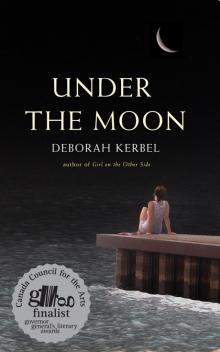 Under the Moon
Under the Moon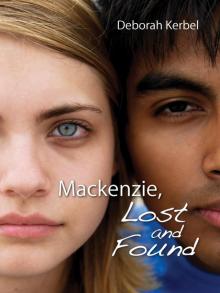 Mackenzie, Lost and Found
Mackenzie, Lost and Found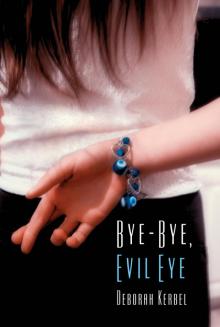 Bye-Bye, Evil Eye
Bye-Bye, Evil Eye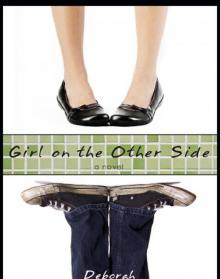 Girl on the Other Side
Girl on the Other Side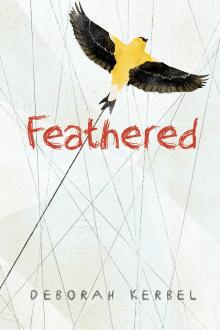 Feathered
Feathered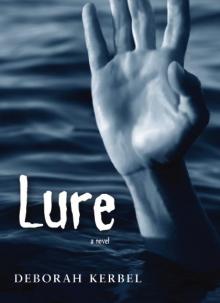 Lure
Lure